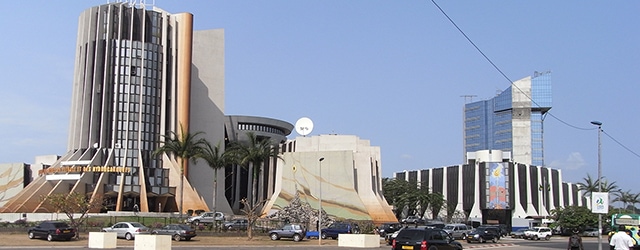Gabon is cleaning its fiscal house, and hopes to prove it can be more than just an oil producer.

|
GABON: VITAL STATISTICS |
|---|
|
Location: Central Africa |
|
Neighbors: Equatorial Guinea, Cameroon, Republic of the Congo |
|
Capital city: Libreville |
|
Population (2019): 2,197,343 |
|
Official languages: French |
|
GDP per capita (2018): US$8,029.80 |
|
GDP growth (2018): 1.2% |
|
Inflation (2018):4.7% |
|
Currency: Central African Franc |
|
Investment promotion agency: Gabon National Investment Promotion Agency |
|
Investment incentives available: Tax credits and exemptions |
|
Ease of Doing Business rank (2019): 169 |
|
Corruption Perceptions Index rank (2018): 124 |
|
Political risks: Continued uncertainty regarding President Ali Bongo Ondimba’s health |
|
Security risks: Dispute with Equatorial Guinea over neighboring islands; destination and transit country for adults and children from West and Central African countries subjected to forced labor and sex trafficking; incidents of robbery, armed attacks, carjackings and rape; armed attacks on commercial shipping in the Gulf of Guinea; violent clashes between demonstrators and security forces |
|
PROS |
|---|
|
Strategic location |
|
New hydrocarbon code |
|
Continued relationship with France |
|
CONS |
|---|
|
Extremely limited capital pools |
|
Use of the Central African Franc means Gabon has little control over monetary policy |
|
Sources: Africa Middle East News and Perspectives, AllAfrica, Best’s Country Risk Report: Gabon, CIA World Factbook, The Economist, France 24, International Monetary Fund, L’Union, Mail & Guardian, NDTV, Teller Report, Transparency International, UK Government Travel Advisory, US State Department, World Bank, World Population Review |
|
For more information, check out Global Finance‘s Gabon Economic Report data page. |
Rich in resources but reliant on oil revenues, the tiny Gabonese Republic paints a complex picture: of opportunity and improved fiscal performance coupled with financial uncertainty and political instability.
“All of the countries that became dependent on oil are having problems right now,” says Corti Paul Lakuma, macroeconomist and research fellow at Uganda’s Economic Policy Research Centre. Yet, Gabon’s prospects look brighter than others’ in some important respects.
In December, Fitch Ratings affirmed its B rating with a stable outlook, citing “an improving fiscal trajectory.” “The country went from debt to a surplus at the end of 2019,” notes Cedric Berry, associate director at Fitch. One contributor: increased tax revenues due to tougher enforcement of tax and customs laws, fewer exemptions and less government willingness to allow offsets for companies in arrears. Fitch views taxes as a more stable source of income than oil.
Gabon received $200 million in loans through the World Bank in 2018 and 2019. Final results for 2019 are projected to show national debt down to $9.34 billion, from a five-year high of $9.59 billion in 2018. Growth could rebound to 2.9% in 2019, according to the World Bank.
Oil remains a question mark, however. “From 2010 to 2016, oil accounted for approximately 80% of Gabon’s exports, 45% of its GDP, and 60% of its state budget revenues,” according to the CIA Factbook. This year the government passed into law a new hydrocarbon code, but profits from this sector are slow to materialize and the state is unlikely to see benefits from production for five years or more, says Berry.
African oil states like Gabon have had to work at making themselves more attractive to foreign investors. According to the US State Department, Gabon is working to attract investment in infrastructure, timber, mining and ecotourism. Its timber industry is increasingly focused on downstream products, and is getting support from the African Development Bank via the SIAT Gabon Agricultural Expansion Project.
Economic inequality is a major problem, as elites monopolize oil revenues. “When you go down to the ground,” says Lakuma, “the income is not really well distributed.”
That exacerbates Gabon’s political instability. President Ali Bongo Ondimba assumed power in 2009 following the death of his father, whose rule was marked by accusations of corruption, tribal favoritism, election rigging, and intimidation—even assassination—of opponents. The heir narrowly won the 2016 election, but his victory was tainted with accusations of vote rigging, and protests were met with violence. Last January, a group of military officers failed in an attempted coup, but the threat remains.
Gabonese are not sanguine about their future. In a 2017 survey, Afrobarometer found that less than 20% of Gabonese believed the 2016 election was “free and fair,” and 43% considered improvements in the electoral process “not at all likely.”
The country is plagued by corruption. “The poor quality of Gabon’s business climate is a major barrier,” says the World Bank. In a unique scam that involves the judiciary, companies are sued over phony debts and, if they don’t pay up, hit with punitive penalties on top of the fictitious debts. L’Union, a Gabon newspaper, recently reported that more than 85 billion Central African Francs ($144 million) had “evaporated” over two years from the Gabon Oil Company.
Not surprisingly, net FDI inflows fell from a peak of $1.5 billion in 2017 to $846 million in 2018. While the 2019 figure has not yet been released, it is expected to drop further. Growth in GDP for Gabon declined from 7.1% in 2010 to 1.2% in 2018.



